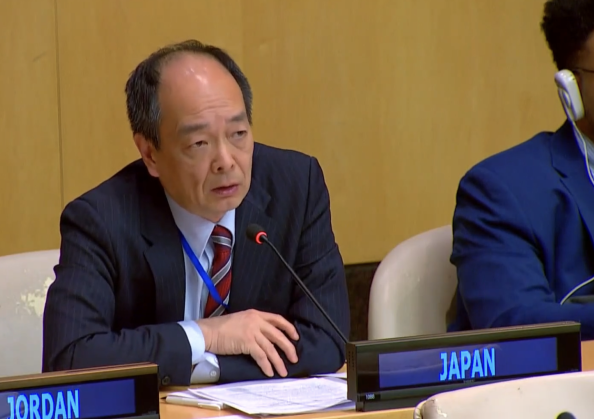Statement by H.E. Ambassador YAMANAKA Osamu, Deputy Permanent Representative of Japan to the United Nations, at the Second informal meeting on the political declaration of the SDG Summit
2023/3/16

At the outset, I would like to express Japan’s gratitude to the co-facilitators for hosting this second informal consultation and sharing the elements paper.
Japan commends the elements paper for providing an important basis for further work. We support the overall concept of "a consensual, concise, action-oriented, transformative and ambitious document". We would also like to reiterate the importance of a high-level political commitment to achieve SDGs at this midway point. On this basis, I would like to comment on the following points:
First, the UNDP report on human security, which was published last year, reveals that an estimated six out of every seven people across the world already felt insecure in the years prior to the COVID-19 Pandemic. In the same report, Secretary-General discusses “the concept of human security as a tool to accelerate the achievement of the SDGs by 2030.”
This report places a great importance to solidarity and trust among people, underpinned by the agency of individuals to act independently and make their own free choices. They are key enablers of our collective efforts to achieve the 2030 Agenda, especially so at the time when our world faces the multiple crises, which has a high relevance with the 1st bullet point under the subtitle: “Turning Our World toward 2030”. I would also like to point out that the draft Global Sustainable Development Report states that “in the 21st Century, solidarity and international cooperation are instrumental to human security.” Japan will continue to work with the United Nations and Member States to deepen the discussion on human security in this new era of multifaceted uncertainties, which should also lead our efforts to achieve the SDGs.
Second, we believe it is extremely important that the international community work together to achieve Universal Health Coverage (UHC) in order to leave no one’s health behind, promote a renewed response to preexisting health challenges set back by COVID-19, and make society more resilient to future health crises.
In this connection, I would like to refer to the High-Level Meeting on UHC, one of three health-related High-Level Meetings to be held this September. We will continue to work towards the success of all three health-related High-Level Meetings including UHC in close coordination with other Member States.
Third, I would like to emphasize that in an age of uncertainty, the best way forward is to invest in people as reflected in the outcomes of the Transforming Education Summit (TES). Education is one of most powerful and effective tools we have to empower individuals to make good decisions and find solutions to tackle our common agenda and achieve the SDGs. Thus, we should follow up the TES appropriately and promote further cooperation in education.
Fourth, regarding “building resilience”, it is important to enhance the resilience of individuals, societies, and nations to cope with the changes and challenges specific to our times. In relation to "addressing disasters," the upcoming High-Level Meeting of the Midterm Review of the Sendai Framework to be held in May will be an important opportunity to promote disaster risk reduction. It is the last chance before 2030 to identify and begin to implement the innovative solutions, policies, and course-corrections needed to prevent and prepare for the new and emerging risks that threaten current and future generations.
Last but not least, we believe that the efforts of companies are an indispensable piece of the overall efforts to achieve the SDGs. That said, while we welcome all efforts by private sectors to achieve the SDGs, including ESG investment, we should be mindful about SDG-washing, as pointed out in the "Integrity Matters" report released last year by the United Nations’ High‑Level Expert Group. It is also significant to find out what can be done to ensure a "level playing field" of opportunities for all multinational companies.
In closing, I would like to reiterate Japan’s commitment to contribute constructively to this process. We will continue to collaborate closely with the co-facilitators and our fellow Member States to this end.
I thank you.
